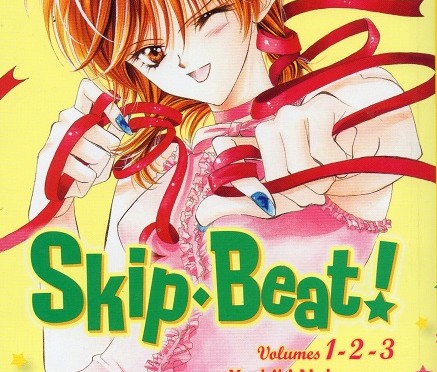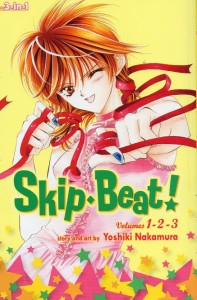Manga Review: Skip-Beat! Volumes 1-2-3 by Yoshiki Nakamura
Kyouko Mogami and Shoutaro “Shou” Fuwa grew up together after Kyouko’s mother largely abandoned her. The Fuwa family runs a chain of traditional Japanese inns, but Shou didn’t want to go into that business, partially because it is the proprietress that is the face of the inn, while the husband does all the dull management work. So he ran away to Tokyo to get famous in show business, and asked Kyouko to go with him.
Kyouko adored Shou, and dropped out of school to go with him. She took multiple part time jobs so she can support Shou and pay his living expenses while he works for his big break. A couple of years pass, and now Shou is climbing the charts as a singer, and hardly ever home in the apartment Kyouko pays for and stocks with his favorite foods. Shou’s also been acting more coldly towards Kyouko, and it’s harder for her to make excuses for his behavior.
Then Kyouko happens to overhear Shou talking to his manager, and learns from his own mouth that he brought her with him to Tokyo solely to be his housekeeper and source of income. Shou has never considered her anything but a convenient servant. (Later, Kyouko will realize that the Fuwa family was grooming her to be Shou’s wife, which partially explains his contempt for her.)
This revelation breaks Kyouko’s heart, but rather than dissolve in sorrow, the Pandora’s Box in her heart opens, and all her stored up resentment and hatred pours out. She vows to crush Shou in the one area he cares about, popularity. Kyouko will become a celebrity!
Of course, it’s going to be pretty hard for a plain girl who can’t sing, has never acted and has no idea how show business works to make it to the top. Worse, she has a fatal flaw to overcome–can she make an audience love her if she’s unable to love the audience?
This is a shoujo (girls’) manga series from 2002, being reprinted in omnibus volumes, this one being the first three. These collected editions are helpful with the longer series, as some character development and plot movement can be seen in one sitting.
Kyouko is an interesting protagonist for the shoujo field in that her negative personality traits are right up front, and dealing with her inner demons (which aren’t entirely metaphorical) is given more emphasis than her romantic life. She has admirable guts and determination, but isn’t good at empathy and most of her social skills were a mask to hide her abandonment issues.
On the other hand, her prickliness allows her to shock others into examine their own behavior…except Shou, so far. He remains the spoiled, narcissistic child he starts as. Ren, the most likely romantic interest, blows hot and cold as is the tradition for shoujo romance–he’s kinder than he looks, but takes his job seriously to a fault.
There are a couple of other women who have their own pain that is limiting their careers, and they eventually warm up to Kyouko. The most bizarre character is talent agency owner Lory Takarada. He’s a big believer in “love” and comes up with strange schemes to improve Kyouko and her fellow “Love Me Section” members.
The art varies from detailed to crude depending on the moment–it suits the mood well, but may be offputting to some readers.
This story is aimed at middle school girls and up, although parents might want to remind younger readers that one of the lessons they can take from this series is “don’t quit school; no guy is worth it.” Parents may also want to talk to their kids about the healthy ways of dealing with painful emotions.



Wow. you know, Scott, it’s pretty interesting to read your review, and consider who the audience is directed at. What an eye opener. If I had a young daughter, I don’t know that I’d be too happy for her to be filling her head with stories like this–you are right on about the whole message of quitting school! What ever happened to the days of “My Friend Flicka” ? 😉
Oh, “a girl and her horse” books are still around and new ones being written even in the 21st Century. They’re just not big in Japan.
In fairness, Kyouko’s decision to drop out of school is depicted as a *terrible* idea, which she belatedly realizes once Shou shows his true colors. Indeed, the third volume’s subplot is her trying to get into a school so she can get the education she missed.
It’s also made clear that Kyouko and Shou never had sex, or even kissed–they may have lived in the same apartment, but that was for his convenience.